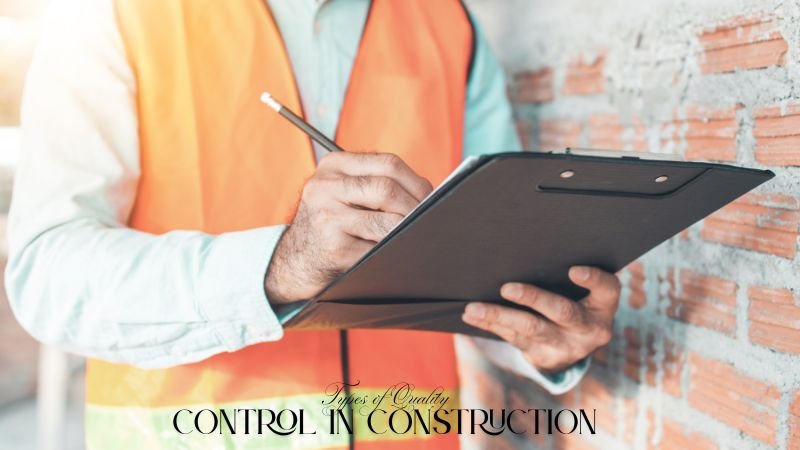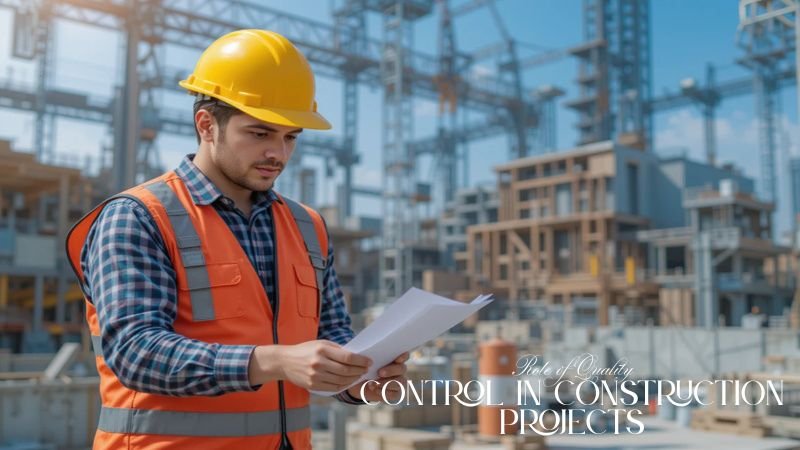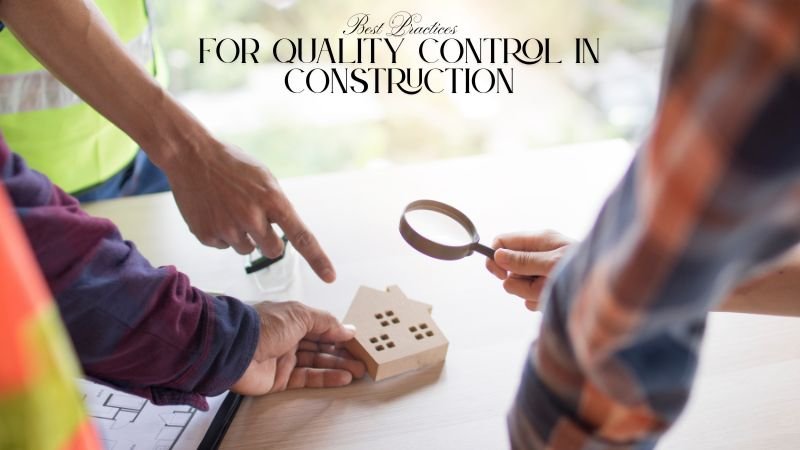Best Practices for Quality Control in Construction
Introduction
When you’re building something whether it’s your new home in Lahore or a big commercial plaza quality control is key to making sure everything is done the right way.Think of it like making sure your homework is perfect before you hand it in. In construction, quality control means checking every step to avoid costly mistakes and problems later on.
In this blog, we’ll explain why quality control is super important, how it helps save time and money, and the best practices to follow for a strong and safe building. Let’s dive in and learn how quality control can make your construction project a success.
What is Quality Control in Construction?
Quality control in construction means making sure everything is done the right way. It’s like checking your homework before giving it to the teacher you make sure there are no mistakes. In construction, workers and engineers check every part of the project from start to finish.
From the beginning like choosing the right bricks, cement, and steel to the ending like painting the walls or installing lights everything must be perfect. If something is not done right, it can cause big problems later, like cracks, leaks, or even safety risks.
That’s why quality control is super important. It keeps buildings strong, safe, and beautiful.
Simple Definition:
“Doing the job right, from start to finish.”
Just like baking a cake with the correct recipe, quality control makes sure your construction project is a success.
Why is Quality Control Important in Construction?
Quality control is super important in construction because it helps everything go smoothly. When you check the work at every step, big problems don’t happen.
1. Saves Money: If things are done right the first time, you won’t need to fix them later. No extra cost.
2. Saves Time: Good quality work means no delays. The project finishes faster without any trouble.
3. Protects Reputation: Happy clients will trust you and tell others too. That means more jobs.
4. Keeps People Safe: Strong and well-made buildings keep everyone safe at home, school, or office.
Also Read DHA Phase 7 Lahore – Location, Property Rates & Construction
Types of Quality Control in Construction

Quality control doesn’t happen just once. It happens in different stages of the project. Here are the three main types of quality control in construction:
1. Pre-Construction Quality Control
This is the first step before any work begins.
1. Planning and Design Checks: Engineers and architects review the designs to make sure everything is correct.
2. Material Approvals: Only strong and trusted materials like cement, bricks, and steel are approved.
3. Contractor Verification: The team checks if the builders and workers are skilled and experienced for the job.
2. In-Progress Quality Control
This happens while the construction is going on.
1. On-Site Inspections: Experts visit the site to check the quality of work every day.
2. Daily Quality Reports: A record is made to keep track of what’s done and what needs fixing.
3. Material Testing: Materials like cement and steel are tested to make sure they are strong and safe.
3. Post-Construction Quality Control
This is the final stage after the work is done.
1. Final Inspections: The whole building is checked to see if everything is perfect.
2. Client Walkthroughs: The client visits and checks the building before moving in.
3. Issue Resolution: Any remaining problems are fixed, and final documents are prepared.
Role of Quality Control in Construction Projects

Quality control plays a big part in making a construction project successful. Let’s break it down in a simple way:
1. Design Verification
Before work begins, experts check the building plans to make sure the design is correct and safe.
2. Material Testing
Things like bricks, cement, steel, and wood are tested to make sure they are strong and of good quality.
3. Workmanship Check
Supervisors watch the workers to make sure everything is done properly and neatly.
4. Compliance Assurance
All the work must follow building rules and safety codes, both local and international.
Also Read Top Builders in Lahore – Best Construction Services
Best Practices for Quality Control in Construction
Want your construction project to be strong, safe, and long-lasting? Follow these smart and simple quality control practices.
1. Use Approved Materials Only
Always buy cement, bricks, and steel from trusted shops. Cheap or fake materials can cause big problems later.
2. Hire Skilled Labor & Supervision
Great work comes from great people. Hire experienced workers and supervisors who know what they’re doing.
3. Follow Construction Checklists
Make a step-by-step list. Every task like pouring concrete or painting walls should be ticked off. No skipping.
4. Regular Site Inspections
Check the site every day or at least once a week. Early checks catch mistakes before they become serious.
5. Third-Party Testing
Call experts to test materials like soil, concrete, or steel in labs. It adds an extra layer of safety.
6. Document Everything
Write down what materials were used, what the weather was like, and what work was done. Keep photos too.
7. Train Your Team
Teach your workers about safety rules and how to do quality work. A smart team builds better.
8. Follow Health & Safety Guidelines
Use helmets, gloves, fences, and keep the site clean. Safe sites = better quality.
Also Read Grey Structure Rate in Lahore Get the Best Price Today
Advantages of Quality Control in Construction
Quality control is not just about checking things it’s about building smart, safe, and strong projects. Here’s why it matters so much:
1. Better Customer Satisfaction
When a building is made the right way, the client feels happy and proud. It shows that you care about their dream home or office. Happy clients talk about your work and bring you more customers.
2. Fewer Mistakes & Rework
When everything is checked step by step, mistakes don’t happen often. That means you don’t have to waste time or money fixing things again. Less rework = faster project = saved budget.
3. Long-Term Durability
A well-built home or office lasts for many years. Good quality materials and expert work make sure the building stays strong with fewer repairs needed.
4. Legal Safety
Following building rules and safety codes protects you from legal trouble. If inspectors come, you’ll pass with flying colors and no one will stop your project.
Also Read 8 Marla House Construction Cost in Lahore Build Yours Today
Challenges Without Quality Control
If quality control is missing, big problems can happen.
1. Walls can get cracks.
2. Foundations may become weak.
3. Water can leak from roofs or pipes.
4. The building’s value goes down.
5. It’s not safe to live or work inside.
Quality matters always.
Why Highland Properties & Constructions Focuses on Quality
With 17+ years of experience in Lahore, Highland Properties & Constructions believes that quality is not optional it’s essential.
1. We use lab-tested materials.
2. Our engineers inspect daily.
3. We maintain digital records for client transparency.
4. We offer long-term maintenance tips post-completion.
Quick Pro Tips for Clients
Here are some simple tips to make sure your project goes smoothly:
1. Always ask your contractor if they’re testing the materials for quality.
2. Visit the construction site at least once a week.
3. Check the brands of materials being used.
4. Take pictures of foundations and steel work.
5. Ask for a post-construction checklist to ensure everything is done right.
Conclusion: Build Smart, Build Right
Quality control in construction is not just a process it’s the foundation of trust. Whether you’re building a 5 Marla house in Lahore or a multi-story plaza, following best practices for quality control ensures strength, beauty, and safety.
Trust Highland Properties & Constructions to deliver high-quality work on time, every time.
FAQs – Quality Control in Construction
1. What is the main goal of quality control in construction?
Ans: To ensure the construction meets design, safety, and strength standards without errors.
Who is responsible for quality control on site?
Ans: Project managers, site engineers, and quality inspectors share responsibility.
How often should inspections be done?
Ans: Ideally, inspections should be done daily or weekly depending on the project stage.
What happens if poor-quality work is found?
Ans: The affected area is corrected, re-tested, and documented before continuing.
Is quality control expensive?
Ans: No. In fact, it saves money by preventing future rework or legal issues.





Leave a Reply